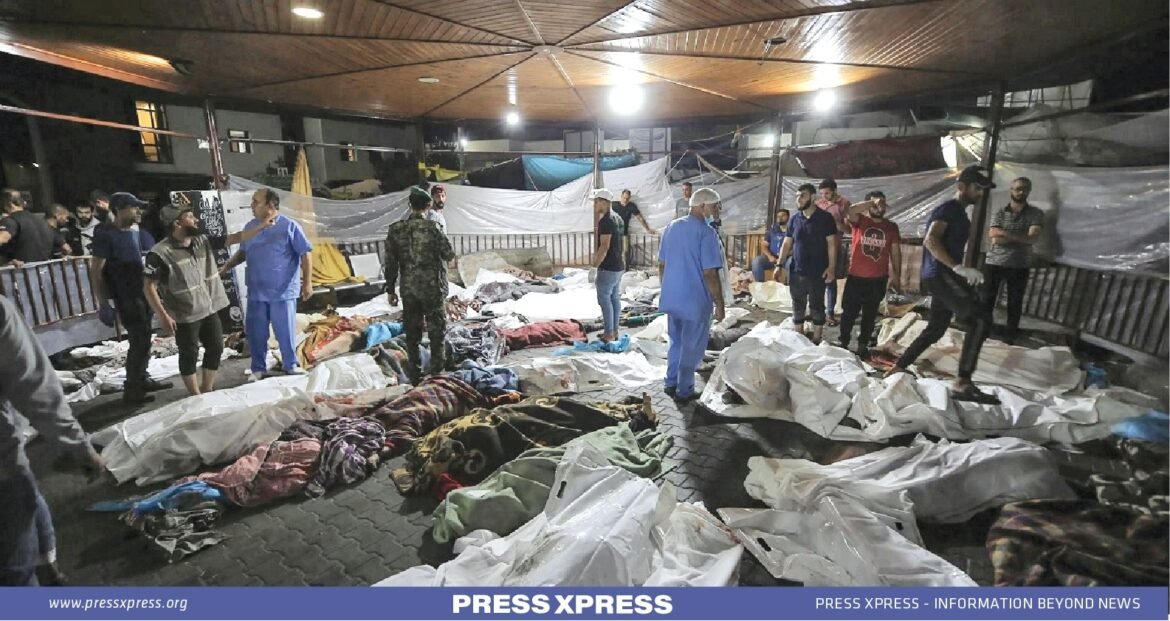In a harrowing development on Sunday morning, September 29, 2023, Israel has ordered the evacuation of Gaza’s al-Quds Hospital, a crucial lifeline for Palestinian residents. The information is revealed from a source of Palestinian Red Crescent. The humanitarian organization made the chilling announcement via social media, citing the imminent threat of a devastating bomb strike on the hospital.
You can also read: Is China’s Rising Mediation Role Challenging US Influence in the Israel-Palestine Conflict?
In a grim update from Gaza, the enclave’s health ministry has reported a devastating toll, revealing that at least 8,005 people have lost their lives since the conflict erupted on October 7, 2023. This staggering number includes a deeply distressing count of 3,342 children and 2,062 women who have tragically become victims of the relentless violence.
Residents scramble for “basic survival items” in Gaza
As tensions escalate, the situation in Gaza has taken a dire turn, with residents desperately breaking into aid warehouses and distribution centers. They scrambled to secure essential supplies, including flour and other “basic survival items,” a stark testament to the profound desperation gripping the besieged enclave. The United Nations Palestinian refugee agency (UNRWA) expressed deep concern, highlighting the breakdown of civil order in the wake of weeks of war and a stringent blockade on Gaza.
Meanwhile, the West Bank’s death toll continues to mount, with at least 114 Palestinians killed by Israeli forces since October 7, as reported by the Palestinian news agency Wafa. Tragically, three more Palestinians lost their lives on Sunday morning, underscoring the relentless violence in the region.
Recently, the Israeli military has issued a stark warning to residents in northern Gaza, urging them to evacuate and head south. Promising humanitarian aid, including food, water, and medicine, the military spokesperson, Daniel Hagari, highlighted expanded efforts by Egypt and the United States to aid Gaza. This announcement comes amidst limited access to essential supplies, with just 84 trucks allowed into Gaza since the reopening of the Rafah border with Egypt on October 21, as per Doctors Without Borders.
Casualties mount as Israeli airstrikes continue
In the war-torn region of Gaza, it is the 23rd day since the conflict erupted on October 7th. After enduring a two-day near communication blackout, a glimmer of hope emerged on Sunday morning as internet connectivity was partially restored. This restoration led to a surge of posts from journalists and social media users in Gaza, proclaiming their resilience and survival. It also allowed Palestinians from around the world to reconnect with their loved ones in the besieged enclave.
However, as the internet flickered back to life, it also unveiled the grim reality of the conflict. Since the blackout, Israel unleashed the heaviest bombardment Gaza has witnessed, accompanied by ground incursions, shrouding the region in a cloak of uncertainty.
“We will make him taste defeat”: Al-Qassam Brigades spokesperson
In the midst of an escalating conflict, Al-Qassam Brigades released a video statement from their spokesperson, Abu Obeida. In this address, he addressed Israel’s expansion of ground operations, lamented the lack of humanitarian assistance from Arab countries, and pointed fingers at Israel for the failure to reach an agreement on a prisoner swap.
On Saturday, October 28, Israeli Prime Minister Benjamin Netanyahu declared the commencement of what he termed the second phase of the war, signalling an expansion of ground operations into Gaza.
In a defiant response, Abu Obeida declared, “We are still waiting for him. We will make him taste, by the strength of God, a defeat greater than what he expects or fears.” These words underscore the determination in the face of adversity that characterizes the ongoing conflict.
Abu Obeida did not stop there. He also chastised the Arab world for its perceived inadequacy in providing humanitarian aid to the beleaguered civilians of Gaza. He urged Arab leaders not to mobilize their armies but questioned whether they had reached a point where they could not even send relief and humanitarian assistance.
Several Arab nations, including the United Arab Emirates, Qatar, Jordan, and Tunisia, have offered aid to Egypt to support its efforts to provide assistance to Gaza. Nonetheless, aid entering the Rafah border crossing remains limited, adding to the challenges faced by Gaza’s residents.
In his third point, Abu Obeida emphasized the existence of “numerous contacts regarding the prisoner issue” and the potential for a deal. However, he squarely laid blame on Israel, alleging its unwillingness to agree to the terms.
US asserts Israel’s responsibility to protect civilians amidst Gaza conflict
US National Security Advisor Jake Sullivan, in an interview, emphasized the urgency of protecting civilians in this development.
Meanwhile, British Prime Minister Rishi Sunak and French President Emmanuel Macron, in a recent conversation, highlighted the critical need for immediate humanitarian assistance in Gaza. A spokesperson for the UK government reported that both leaders have “agreed to work together on efforts both to get crucial food, fuel, water, and medicine to those who need it, and to get foreign nationals out of the conflict zone.”
In the midst of these diplomatic efforts, the armed faction of the Palestinian Islamic Jihad has reported targeting Israeli forces with mortar shells in the eastern region of Rafah. Additionally, the Al-Quds Brigades issued a statement on Telegram, claiming responsibility for an attack on the Netiv Ha’Asara settlement with rockets. Their statement asserted, “Al-Quds Brigades bombarded the occupied area of ‘Netiv Ha’Asara’ with a missile barrage as part of the Al-Aqsa Flood Battle.”
Tragedy continues to mount with an updated report from the Palestinian news agency Wafa, stating that over 100 Palestinians have lost their lives due to Israeli air strikes on Sunday. The casualties include dozens in al-Shati camp, with bodies still trapped beneath the rubble. In al-Zaytoun neighborhood, at least 30 citizens were killed, and numerous others wounded. In Jabalia refugee camp, Israeli air strikes targeted 110 homes, claiming the lives of at least 45 people. Additionally, a residential square in Bir al-Naja was obliterated, resulting in further loss of life.


